Mentors
The Indigenous Women in Community Leadership program includes the guidance and support of experienced mentors who work with program participants. Current IWCL mentors are listed below.
To enquire about being a mentor, contact womenlead@stfx.ca.
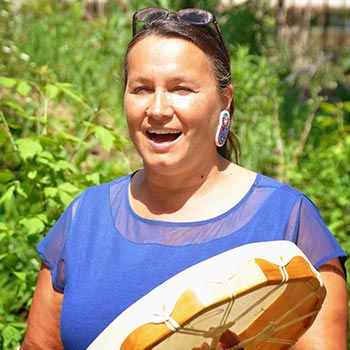
Read More
Kathy Absolon (Minogiizhigokwe – Shining Day Woman) is Anishinaabe kwe who is a community helper, knowledge seeker, knowledge carrier, educator, re-searcher and writer. Kathy is a member of Flying Post First Nation Treaty 9.
At the age of 62, Kathy carries truth stories about both a rich cultural history and Canada’s colonial history. Her lifetime of work in decolonial stories and Indigenous education has been informed by her land-based philosophy.
Currently, Kathy is a Professor in the Indigenous Field of Study, Masters of Social Work Program in the Faculty of Social Work and the Director of the Centre for Indigegogy at Wilfrid Laurier University.
She spent the first 20 years of her life living in the bush in a place called Cranberry Lake. The land, she says, is a library of knowledge and taught her so much about life and she continues to reflect and draw on her land-based teachings. Her passion for wellness among her peoples and the restoration of Indigenous knowledge in Creation has been one of the driving forces in her life work as an Indigenous wholistic practitioner in child welfare, Native mental health, youth justice, education, and community work. Over the last 35 years, her academic and cultural work has been in restoring, reclaiming, re-righting Indigenous history, knowledge, cultural worldviews and making the invisible visible – decolonization.
She promotes this through Indigenous research methodologies and published “Kaandossiwin, How we come to know” (2011) and in her recently published 2nd edition (Fernwood Publishing) of Kaandossiwin How We Come to Know (2022). Indigenous re-Search. Currently, Kathy is co-editing another book related to Decolonizing Journeys, forthcoming in 2025. She has authored book chapters, journal articles, multi-media projects and other works in wholistic practice, social inclusion, reconciliation, community healing and wellness and Indigenous knowledge.
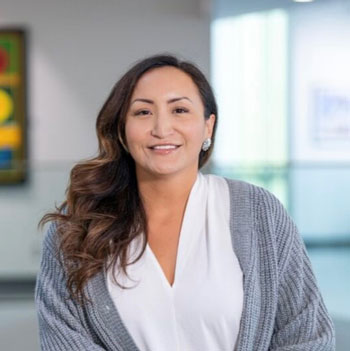
Read More
Terri Cardinal is a nehiyaw iskwew (Cree woman) from Saddle Lake Cree Nation in Treaty 6 Territory. Professionally, Terri works at MacEwan University, where she is the director of Indigenous Initiatives and teaches sessionally in an Indigenous Master of Social Work program. Terri assisted on a project with Blue Quills University as the Indian Residential School Coordinator in previous years and continues to support that project. She has previously worked in First Nations communities developing and implementing culturally appropriate programming for Indigenous families while mentoring front line workers in the Health and Social Work field. She completed her clinical MSW specializing in trauma with the University of Calgary and is currently pursuing her PhD in Social Work with the University of Calgary. Terri research and passion focuses on ceremony is healing, Indigenous love, nehiyaw trauma informed practices, identity and Indigenous land-based learning.
In her aspirations, she has been a part of creating and supporting many Indigenous films and resources. She advocated and co-led the City of Edmonton Indigenous naming committee in 2020. Terri is the co-host and co-creator of “2 Crees in a Pod”, a Podcast that amplifies Indigenous voices to honor Indigenous helping practices. In addition, along with her colleague she delivers Indigenous trauma informed practices and Indigenous Love workshops with Indigenous communities. She sits as a member of the Social Work National Indigenous Accreditation Board and the external Indigenous Advisory Council for Edmonton Public Schools. She is currently on the City of Edmonton Anti-racism committee tasked with creating recommendations of an independent body that addresses racism. She chairs the Indigenous Advisory Council for MacEwan University and has led Indigenous focused lectures internationally.
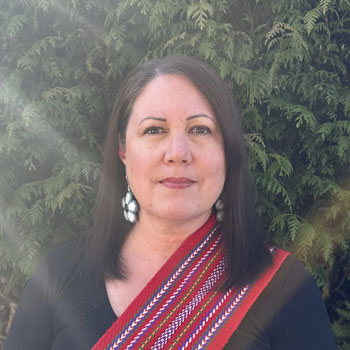
Read More
Carmen Carriere lives on the ancestral and treaty territory of the Tsawwassen First Nation and the unceded territory of the Musqueam people, outside of what is colonially known as Vancouver, British Columbia, where she and her husband raised their four children. Carmen is a proud Michif woman and a citizen of Métis Nation British Columbia, whose roots run deep in the Red River from St. Boniface to St. Laurent, Manitoba. Her family names are Carriere, Hamelin, Perreault, Larence, Parenteau, Vandal, St.Germain, McGillivray, Landry and, most significantly perhaps, the unnamed women simply listed as Cree and Obijwe on her family tree.
Carmen received her Bachelor of Arts in History and her Bachelor of Education from the University of British Columbia, while she more recently completed the Indigenous Women in Community Leadership program with the Coady Institute at St. Francis Xavier University. As someone who values education, Carmen believes that lived experience is a great educator and it has informed much of her learning through parenting, reading, volunteering, teaching and advocating.
Professionally, Carmen has worked as a secondary Social Studies and English teacher, was a coordinator for the Children’s Heart Network, has been an advocate with the Children’s Organ Transplant Society and the Canadian Donation and Transplant Research Program, while she has also facilitated cultural sensitivity training with the UBC Centre for Excellence in Indigenous Health. Apart from her credentialed involvements, Carmen’s most impactful job experience has come from working as a mother for 25 years in the raising of her two sons, Joshua and Adam, and her two daughters Brynn and Olivia – and her favorite child, her dog Casey (she continues to parent her young adult children when asked!). Carmen is currently the Region 2 (BC Lower Mainland and Fraser Valley) women’s representative and vice-chair for Métis Women British Columbia and intends to run in the upcoming September election for the Women’s Chair on the Métis Nation British Columbia (MNBC) governance board.
Through her work with MNBC, Carmen has been called upon to participate in a variety of areas and committee work, particularly in the areas of healthcare and education. She most recently spoke at the Métis National Council on behalf of MNBC and continues to be part of the MNBC governance committee, where she is one of the co-chairs for the MNBC governing assemblies. With her background in teaching, Carmen also sits as the Métis representative on the Indigenous Education Advisory Committee for the Vancouver School Board.
Informed by her lived experience advocating for her father and daughter who live with a disability and chronic health conditions, Carmen is passionate about culturally sensitive and accessible healthcare. Walking alongside her family has given her valuable experience and insight into systems that are often difficult to navigate, underscoring the need to be grounded in culture and community. Because of this, Carmen now serves on 3 Indigenous health related committees. Her most recent appointment by MNBC has been to the Fraser Health Authority’s Indigenous Feedback and Accountability Committee for the new Fraser Salish Health Accord signed between the Province of British Columbia, the First Nations Health Authority and MNBC.
Carmen also loves to spend time being creative and feeding her soul through writing non-fiction stories and essays about her life experiences that have informed how she thinks about the world around her. During her time in the Indigenous Women in Community Leadership program, she produced a collection of stories about Métis women and identity. Carmen is excited to have her first piece published later this year with the BC Federation of Writers.
While all of this may sound busy, Carmen ultimately loves to be home enjoying a good book, movies, writing, walking along the beach with Casey, yoga, her family, and a good cup of Jasmine green tea. She is a strong advocate for Indigenous women, girls and two-spirit, and promotes the reciprocal relationship between the generations. Carmen firmly believes in asking questions, pushing for reconciliation and advocating alongside those who seek equity, while underscoring that there is always more to know and learn, and being curious is a good thing.
Instagram: @carrierecarmen
Facebook: @Carmen Carriere
Website: www.carmencarriere.ca
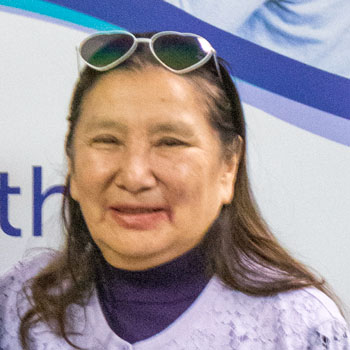
Read More
Ningwakwe George is an Anishinaabe Kwe from Saugeen First Nation (SFN). Her experience at the Brantford Mohawk Institute and the Saugeen Indian Day School birthed her belief that we can achieve what we set our Hearts on and overcome adversity by living Creator’s Laws. It spawned her heartfelt desire to find a better way of being with people by seeing the Gifts in them, especially when those Gifts might be buried under the effects of their personal histories..
Ningwakwe is an educator with 14 years teaching in the institutional educational system, and 40 years serving in community-based initiatives:
- as an Indigenous adult literacy coordinator;
- as the Indigenous Mentor/Visiting Elder at Saugeen District Senior School (SDSS) since Fall 2014, supporting students and their families through the issues that impact on a student’s ability to be present with their learning; and,
- as a Mental Health researche/Elder/advisor since 2018 on an SFN collaboration with the Centre for Addictions and Mental Health (CAMH) to develop a First Nations Wellness Initiative.
Ningwakwe has been involved in several initiatives in & around Saugeen;
- the Elders Committee;
- SFN’s Hospice-Like Space;
- the Wellness Centre in Owen Sound to make it more responsive to Indigenous people; and,
- the Residential School Monument.
Ningwakwe has been involved with the Further Education Society of Alberta (FESA) for 20 years delivering workshops on Literacy and Essential Skills through an Indigenous Lens, as well as on Reconciliation Begins with Me. She is co-chair of the National Advisory Committee on the FESA Pathways project, which creates opportunities for Indigenous Youth Employment in the tourism and government sectors.
Ningwakwe has been a sessional educator on Indigenous Health and Wellbeing at Wilfrid Laurier University (WLU) for 4 years, and is an Elder/Advisor on WLU’s project entitled IndWisdom, which examines how Indigenous Knowledges have been used in research to benefit communities.
Literacy
https://unesdoc.unesco.org/ark:/48223/pf0000217867
https://news.ontario.ca/en/release/18967/ontario-honours-literacy-innovator
Saugeen District Senior School
https://www.bwdsb.on.ca/newsroom/media_releases/return_of_awards_of_excellence
CAMH
https://www.youtube.com/watch?v=j7wEqxpQ6mk
https://www.camh.ca/en/camh-news-and-stories/first-nations-wellness-initiative
https://sparkconferences.com/mentalhealth/hub/
Password: MHEALTH2023
Click on ‘Watch on Demand’ – SFN youth and I are Session 5A
Further Education Society of Alberta (FESA)
IndWisdom
https://sites.google.com/view/indwisdom/team
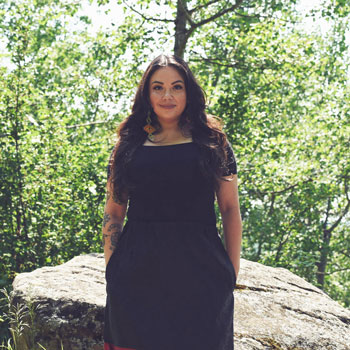
Read More
Helen is a Dane Zaa, Cree, Metis and mixed settler descent woman from Prophet River First Nations. She is the author of the nationally best-selling book, In My Own Moccasins. Her second book, Becoming a Matriarch, reached #1 selling status on the Toronto Star best sellers list.
Helen holds a bachelor’s degree in social work and has worked in advocacy and wellness within Indigenous communities for over a decade. Previously, she worked at a Provincial level in BC with families impacted by MMIWG. She recently held a position at Northern Lights College where she established a successful Elders in Residence program as well as other programming for Indigenous learners. In the past she has developed curriculum and instructed first year social work students who wanted to work in Indigenous communities. She currently serves on her Nations Trust, and on the Indigenous Advisory Committee for the Northern Development Initiative Trust. Over a decade ago, Helen took part in the IWCL program herself and is looking forward to the prospect of potentially returning in a new way.
Currently, Helen is facilitating, speaking, and doing contract work through her own company, Fierce with Heart. Her current creative focus is on writing a fiction novel, a screenplay, and she has other pieces published ranging from poetry to academic articles and a CBC short documentary that focuses on the connection between violence against Indigenous lands and violence against Indigenous bodies. Helen is eleven years sober, enjoys photography, and is a single mom to an amazing teenager.
She believes that we may not always feel well equipped to do the work we are called to, but if we are aligned with purpose then the right mentors, opportunities, and ancestors will show up for us.
Website: https://fiercewithheart.com/
Short Doc: https://www.youtube.com/watch?v=6GbGL7dmEwA
IG: Helenknott05
Twitter: @helen_knott
Email: helen@fiercewithheart.com
Text: 250 280 2277

Read More
KAREN MACKENZIE is a proud Cree-Métis woman. She is the Co-Founder and President of MacKintosh Canada, an Indigenous owned, international consulting company and PeopleBest Canada, a revolutionary, simple, and powerful way to look at what makes success happen inside people by providing the data, analytics and metrics.
Business ownership along with academic and senior management positions has led Karen to this important crossroads in our collective societies where co- creation of the future is both important and enabling. Authentic co- creation reflects true diversity and inclusion where all voices have space to be heard in an open, respectful manner. She is a highly respected authority on individual, team, organizational and community change, the development of strategic alliances and meaningful partnerships, governance, and strategic planning, as well as coaching and mentoring. She holds an MBA.
Karen brings her traditional knowledge of Indigenous ways into the contemporary workplace as this wisdom and way of being reflect “wise practices of purpose driven individuals, communities and organizations”. Through storytelling she engages audiences to learn about the First Peoples and their gifts and traditional knowledge. This learning and worldview expand the perspective and understanding of greater possibilities while building on shared values. This approach supports organizations and communities to co-create a deeper and more meaningful relationships built on trust and respect. She supports individuals in their personal and professional journeys through mentoring relationships that acknowledge their talents and genius, supporting and encouraging diversity on all levels Karen is committed to the “Calls to Action” from the Truth and Reconciliation Commission and works with organizations to bring this awareness and action into their stated goals. Karen inspires audiences to find their inner passion and to move forward in the direction of their dreams. She challenges individuals to recognize their own gifts, talents, and genius and to “let it all out”. Most importantly she assists individuals, teams and families, organizations, and communities from moving where they are today to where they want to be. She is passionate about supporting the dreams and aspirations of the people, organizations, and communities.
Karen is a member of the Edmonton Police Commission and the Circle of Elders for Edmonton Catholic Schools, heralded as a wise practice across Canada enabling greater success rates for First Nations, Métis, and Inuit learners. Karen is an advocate for the United Nations Declarations on the Rights of Indigenous Peoples (UNDRIP). She is a Senior Advisor and mentor to the Indigenous Women in Community Leadership, Coady Institute, St. Francis Xavier University and was recently appointed as one of two members for Alberta to the Independent Advisory Board for Senate Appointments. Most recently, she was recognized as an Albertan SHEInnovates leader under the Global Innovation Coalition for Change (GICC). The GICC is a dynamic partnership between United Nations Women and key representatives from the private sector, academia and nonprofit institutions focused on developing the innovation market to work better for women and to accelerate the achievement of gender equality and women’s empowerment. She is a board member of “Honouring Indigenous Peoples” a national Rotary initiative that reflects the diversity through its members (50% male/50% female; 50% Indigenous/50% non-Indigenous; 50% Rotarian/%0% non-Rotarian). She also sits in an advisory role to the Indigenous Innovation Initiative as part of Grand Challenges Canada that supports innovation viewed through a gender lens and is inclusive of 2SLGBTTQQIA+. Karen is actively involved in the community as a volunteer and was an inaugural member of the Homeless Commission for the city of Edmonton, Alberta. She is a past board member for the Alberta Women Entrepreneurs (AWE), the Advisory Council for IdeaConnector.net, a virtual learning community. She was honoured by her appointment to the Premier’s Advisory Council for the Aboriginal Women’s Economic Security.
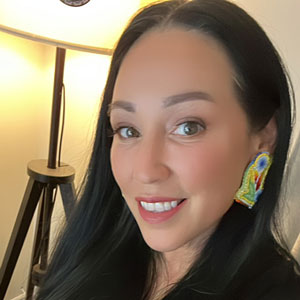
Read More
Michelle Peters is a second year PhD Education student at St. Francis Xavier (STFX) University in Antigonish, Nova Scotia. She holds a Master of Social Work (MSW) and Bachelor of Social Work (BSW) from Dalhousie, and a Bachelor of Business Administration (BBA) from STFX. She is a Registered Social Worker with a private practice where she specializes in counselling and crisis supports with Indigenous communities. Her business name is Etli Npisimkek (where I go to heal) Counselling and Consultation Services.
Michelle is part time faculty at STFX University and teaches Trauma Informed Practice in the Master of Education program. She regularly facilitates programs and training on a variety of topics related to mental health, wellness, and decolonization.
Michelle is the co-chair of the Decolonizing Committee with the Nova Scotia College of Social Workers and provides consultation services throughout Mi’kma’ki. She has extensive experience supporting Indigenous communities, and prior to counselling, she held the position of an Student Service Advisor for the School of Health and Human Services and Indigenous Student Supports for the Nova Scotia Community College (NSCC). Her practice embodies holistic Indigenous ways of knowing and being, promoting healing through Etuaptmumk, trauma informed practice, and connection through culture, language, ceremony and land-based healing.
Email: etlinpisimkekcounselling@gmail.com
Articles featuring Michelle: Decolonizing social work (Connection Magazine Summer 2023) by Nova Scotia College of Social Workers – Issuu
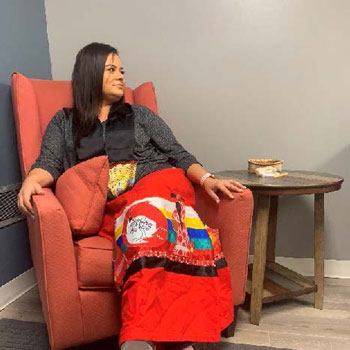
Read More
Wakaanagatoobiik Ndishnikaaz.
“The moment of calmness in a storm”
Naamagos Doodem
– Trout Clan
Six Nations Ndoongii.
Mandi Olson is the Vice Chief Executive Officer of Binesiwag Center for Wellness, a small for-profit, mental health and addictions organization located in Southern Treaty 3. Born, raised, and growing up in Treaty 3, Mandi has rooted herself in her leadership practices through connection to culture and ceremony.
“Today’s trauma is tomorrows resiliency.” A recent graduate of Coady’s Circle of Abundance, Mandi takes pride in honouring ‘Scars’, a grassroots program developed as part of her own work in the program. This project aims to empower women through photography and land-based storytelling and since creation, has successfully supported many women.
Mandi is a graduate with her Social Service Worker diploma, currently completing her undergrad through Laurentian University, is a mother, sister, and an auntie to many.
To learn more about Mandi and the work of her organization, visit www.binesiwagwellness.com
